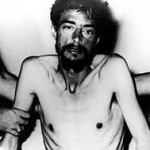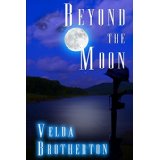Today, Velda Brotherton visits and gives us some insight into  PTSD and how it can affect people. Velda has been writing for over thirty years, and writes sexy, dark, and gritty historical romances, vintage mainstream, and mystery novels, all with an authenticity that makes her characters and stories ring true. In addition she conducts workshops and speaks at conferences as well as co-chairing a successful critique group. Today topic is important. Take a few minutes, please. Leave a comment for a chance to win a book.
PTSD and how it can affect people. Velda has been writing for over thirty years, and writes sexy, dark, and gritty historical romances, vintage mainstream, and mystery novels, all with an authenticity that makes her characters and stories ring true. In addition she conducts workshops and speaks at conferences as well as co-chairing a successful critique group. Today topic is important. Take a few minutes, please. Leave a comment for a chance to win a book.
What if you were walking down the street in your quiet, peaceful hometown and you turned a corner and stepped onto a battlefield? Perhaps reminiscent of the war zone you left five or ten years ago? Your friends, men you fought beside, lie dying all around you, heat and explosions of mortar fire blasts from all directions. It’s as real as if it were happening and you can’t get away. You can’t escape the horror. It’s not a memory, it’s the real thing. And you have been thrown back into a battle so vivid you believe you are there.
 Then think what it would be like in the aftermath, coming to your senses to see people standing around staring, pointing, laughing. They think you’re crazy. Sometimes you are arrested for your behavior in public. You might be unable to hold down a job, you lose your wife and family, you’re homeless on the streets.
Then think what it would be like in the aftermath, coming to your senses to see people standing around staring, pointing, laughing. They think you’re crazy. Sometimes you are arrested for your behavior in public. You might be unable to hold down a job, you lose your wife and family, you’re homeless on the streets.
Known as PTSD, this disorder is more common among veterans returning from battle, but people who undergo any type of traumatic experience can suffer from it as well.
It’s not uncommon for this disorder to strike many years after veterans return from war and take up their former lives. Some veterans and their families live with its effects for many years while others are able to somewhat control their upsetting reactions and return to their previous lives.
Some of the symptoms are frightening nightmares, flashbacks that recall something so vividly that the person actually is there, distrust of those around them, the feeling that no one can love them, withdrawal from loved ones.
PTSD is not new. It’s been around for centuries with various names.
Men returned from World War II suffering from what was referred to as shell shock or battle fatigue. It was often misunderstood and seldom treated.
During the Civil War military physicians, at a loss to treat the problems of soldiers, simply mustered the extreme cases out during the first three years of the war. Many Civil War soldiers returned suffering from what was then known as nostalgia or soldier’s heart. Because there was no treatment, some were sent to asylums, but most of these were closed down after the war. Veterans wandered the streets, many starved to death or froze because everyone thought they were crazy and dangerous and shunned them.
“They were put on trains with no supervision, the name of their home town or state pinned to their tunics, others were left to wander about the countryside until they died from exposure or starvation,” wrote Richard A. Gabriel, a consultant to the Senate and House Armed Services Committees and one of the foremost chroniclers of PTSD.
Gabriel’s research tells us that in 1863 the number of insane soldiers simply wandering around was so great, there was a public outcry. Because of this, and at the urging of surgeons, the first military hospital for the insane was established in 1863.
In earlier times French doctors had termed the symptoms maladie du pays, and the Spanish, confronted with the same reactions among their soldiers, called it estar roto (literally, “to be broken”).
Diaries of men serving in wars as long ago as 1,000 years spoke of suffering from symptoms that match those we see today.
Currently doctors in VA hospitals are treating veterans of Vietnam, Korea, Afghanistan, and  other Middle East conflicts for this disorder once referred to as a syndrome. Some are helped with medication and counseling. Sadly, there are still the homeless veterans who wander the streets, unable or unwilling to get the help they need.
other Middle East conflicts for this disorder once referred to as a syndrome. Some are helped with medication and counseling. Sadly, there are still the homeless veterans who wander the streets, unable or unwilling to get the help they need.
The best thing you can do if you know someone who suffers from PTSD is listen to what they have to say. Encourage them to talk to you about their feelings and experiences. You may not be a counselor who can suggest solutions to them, but you can listen with an open heart and mind and try to be supportive. Show that you care.
And if this is a veteran, don’t forget to thank him for his service.
If you think you might be suffering from PTSD, or know someone who is, here’s a website that lists the symptoms and will help you find solutions.
http://maketheconnection.net/conditions/ptsd?gclid=CMHt_YL_3bwCFZLm7Aodc1MABQ
Writing novels about these men, and meeting people who are dealing with PTSD have given me a greater understanding of what they face. If we haven’t ‘been there’ we can’t truly understand, but we can do our best to offer help and support.
This site is the official voice of Vietnam Veterans of America, Inc., and offers much more information about Post Traumatic Stress Disorder. (http://www.vva.org/archive/TheVeteran/2005_03/feature_HistoryPTSD.htm)
Because  of my interest in this subject and all the research I’ve done, I have written a few books in which a character suffers from PTSD. My latest, BEYOND THE MOON, is the story of Glen Tanner, a Vietnam Veteran who returns home from nine years in a POW camp where he suffered extreme torture. All he can manage to do is paint pictures of the horrors he has undergone. Artist Katherine Kelly is asked to help him turn that talent around and perhaps recover. The two bond and their love becomes one of the healing powers that helps him in his struggle to return to the life he left behind. But can he ever get beyond the pain and terror? I would like to give an Ebook copy to someone drawn from those who comment on this blog.
of my interest in this subject and all the research I’ve done, I have written a few books in which a character suffers from PTSD. My latest, BEYOND THE MOON, is the story of Glen Tanner, a Vietnam Veteran who returns home from nine years in a POW camp where he suffered extreme torture. All he can manage to do is paint pictures of the horrors he has undergone. Artist Katherine Kelly is asked to help him turn that talent around and perhaps recover. The two bond and their love becomes one of the healing powers that helps him in his struggle to return to the life he left behind. But can he ever get beyond the pain and terror? I would like to give an Ebook copy to someone drawn from those who comment on this blog.
JIM: You can find more on Velda and her writing at these links:
Website: http://www.veldabrotherton.com
Blog: http://www.veldabrotherton.wordpress.com
FB: http://www.facebook.com/authorveldabrotherton
Pinterest: http://www.pinterest.com/veldabrotherton
Buy Link: http://www.amazon.com/author/veldabrotherton
Leave a comment for a chance to receive one of her e-books. And give us your thoughts and comments on PTSD. And click on a “Like” or “Share” if you liked this post. Thanks.

Hi Ilona,
Congratulations. Your name has been drawn from those who commented on
Velda Brotherton’s post on The Author’s Blog. You have won a copy of her
book Beyond the Moon.
However, she said she could not get an e-mail to go through to you. And, I haven’t been able to either So, if you can e-mail her at:
vebrotherton@gmail.com
you and she can make arrangements to get the book to you.
Please let me know that you were able to make contact with Velda.
Again, congratulations.
James Callan
I’m writing a book about a returning soldier from WWII with shell shock, and how he wins his sweetheart. I’ve found it’s difficult to conduct interviews with PTS sufferers, however. If I dig too deep, there’s the fear it’ll trigger them. I’m so glad you’re writing about this with so many lives affected, Velda. I can’t wait to read one of your books.
Thanks for reading and commenting on my post, Kathy. Yes, it is difficult, however, have you tried interviewing the wives of these men, or someone who knows them well and cares for them? I’m told by some of these women who’ve read my book that I hit the nail on the head with my hero’s behavior. I hope you are able to get some inside information. I’ve read some novels about this subject and I could tell that the author hadn’t gone deep enough into the subject. Or perhaps they just didn’t want to write about the heartbreak PTSD causes for families as well as the person suffering from the disorder.
There are also some sites online where wives of these men discuss what’s it’s like to love someone with PTSD. Just Google wives of veterans with PTSD.
I appreciate your suggestions, Velda. I hadn’t thought of interviewing their wives. In my story, the vet returns from Europe already enamored with his buddy’s sister. But winning her heart is going to be tough. I haven’t seen a story where the sweetheart is challenged to start a relationship with the PTS sufferer, knowing the potential difficulties. I’m really exploring new territory for me. Thank you so much for sharing your expertise and entering my name in your book drawing.
Kathy, my latest two books, one historical concerning a veteran of the Napoleon wars, and the other a mainstream that takes place after the Vietnam war, concern the women who fall in love with the vet when he returns. Beyond the Moon is the mainstream and the one I’m giving away in the drawing from comments on this blog. We’ll do that Thursday. Both of them show in great detail how the woman deals with the problems PTSD causes.
That’s great, Velda. I look forward to reading them.
Wonderful post! We have to remember and help the vets who are in need. The more who understand this, the better.
Ilona, Thank you for reading and commenting on my post here. I really appreciate your input on dealing with PTSD and helping our vets.
Ilona, you have won a copy of Beyond the Moon in my drawing this afternoon from those who commented on my blog post here. My email will not connect me to your email on your website, so I’m posting it here and asking James to notify you if he can make the email connection. Congratulations. Please send me your email address so I can send your gift card from Amazon for an E copy of my book.
This is a wonderful post. My husband and cousin are Vietnam vets and both have their memories. They both have suffered from PTSD over the years. I agree that we should write books about it and that it has been around for centuries, unrecognized in many cases and untreated. I’m writing a book that has one of the characters who suffers from PTSD and he will reoccur in the series from time to time.
I also think, like you, that writing about it in fictional stories helps people understand it better and not ignore those who suffer with it as outcasts. Those who suffer with PTSD from military service have done so much for the rest of us. I think it is a crime to ignore them and let them die because we’re embarrassed or don’t know what to do around them.
Dianne, Thank you so much for posting and sharing your information. It’s so important that more and more people learn about PTSD. I’m glad your family members have been able to deal with this disorder.
Thanks so much for pointing out that this disorder has been going on as long as there has been war. Being a pacifist, I have never been able to imagine the horror of killing another person, and I can’t help but think that perhaps it means that we were not supposed to be killing each other, whether in a sanctioned war or not.
The more I learn about the horrible effects war has on our vets the more I detest the idea of war, no matter the reason. I’ve begun to believe that only those who start wars should have to take part in them. Thank you for commenting on my blog post.
Great post Velda and Jim. Too many people believe this to be a new problem growing out of our more recent wars. As you point out, it existed in the Civil War and even earlier. Anyone who has read Hemingway, particularly In Our Time,will recognize the symptoms in some of his characters.
Yes, you’re right J.R. Hemingway dealt with this disorder before we gave it the name PTSD. Thank you for reading and commenting on my post.
Too often these precious souls have tried to hide PTSD because they see it as a sign of weakness. Thank God for the wonderful Army doctors who recognized it in my son when he returned from Iraq. It was a hard time for him and his family, but they stuck together through the valley of the shadow and we’re so glad it’s behind him now. It’s good to have novels that address this and can perhaps guide those in need to seek help. Well done!
Sophie, I’m so pleased to hear that your son won his battle against PTSD with the help of his loved ones. Thank you for sharing and commenting on my post.
Thanks for such a relevant post, Velma. Even my Marine son who never saw active combat had to deal with the effects of PTS when he returned from deployment to both Iraq and Afghanistan. We have so little idea what these men and women suffer for us. I’ll definitely check out your books.
Mary, thanks so much for your comment and the information about your son. It doesn’t always take the actual battlefield to cause PTSD. I hope he found the help he needs.
Great interview with wonderful information. I’ll check out all of her books. Thanks, Jim. You always have such interesting authors on your blog!
~Ann
Thanks, Ann. Authors are usually interesting people – if you get to know them. I appreciate your stopping by and leaving a comment.
Ann, I appreciate your reading and commenting on my post here on James’ blog. I do hope you check out my books. I’m sure you’ll find them to your liking. Will add your name to the drawing for a free book.
Wonderful post about a problem that’s more common than many people realize.
Isn’t that the truth. Many people probably never realize they come in contact with a person suffering from PTSD. Thanks for visiting, Nancy.
Nancy, I appreciate your comment and thank you for your interest in my post. Your name will go in the drawing for a free book.